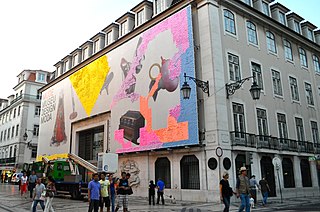
António Agostinho Neto was an Angolan communist politician and poet. He served as the first president of Angola from 1975 to 1979, having led the Popular Movement for the Liberation of Angola (MPLA) in the war for independence (1961–1974). Until his death, he led the MPLA in the civil war (1975–2002). Known also for his literary activities, he is considered Angola's preeminent poet. His birthday is celebrated as National Heroes' Day, a public holiday in Angola.

Banco Nacional Ultramarino is a Macau banking and financial services corporation. It was historically a Portuguese bank with operations throughout the world, especially in Portugal's former overseas provinces. It ceased existence as an independent legal entity in Portugal following its merger in 2001 with Caixa Geral de Depósitos, the government-owned savings bank.

Lubango, formerly known as Sá da Bandeira, is a municipality in Angola, capital of the Huíla Province, with a population of 914,456 in 2022. The city center had a population of 600,751 in 2014 making it the second-most populous city in Angola after the capital city Luanda.

Caixa Geral de Depósitos (CGD) is a Portuguese state-owned banking corporation, and the largest bank in Portugal, established in Lisbon in 1876.
Banco de Poupança e Crédito (BPC) is a government-owned, full service bank in Angola. With some 68 branches, including one in Cabinda, it has the largest branch network in the country.
The Autoridade da Concorrência (AdC) is the Portuguese name for the country's competition regulator, an organisation established to ensure fair commercial competition in Portugal.
Articles related to Namibia include:

Banco Comercial Português is a Portuguese bank that was founded in 1985 and is the largest private bank in the country. BCP is a member of the Euronext 100 stock index and its current chief executive officer is Miguel Maya Dias Pinheiro. BCP is based in Porto, but its operations are headquartered in Oeiras, Greater Lisbon. It operates a branch brand-dubbed and restyled in 2004 as Millennium BCP as well as Banque BCP and ActivoBank.

Isabel dos Santos is an Angolan businesswoman, the eldest child of Angola's former President José Eduardo dos Santos, who ruled the country as a dictator from 1979 to 2017.

Bank Windhoek Limited is a commercial bank in Namibia, which is licensed by the Bank of Namibia (BoN) to operate in the country. It provides financial services to its clients, which include personal, commercial and Small and Medium-sized Enterprise (SME) banking and accounts.
The Namibia Chamber of Commerce and Industry is the industrial and Chamber of Commerce in Namibia. It is headquartered in the capital Windhoek. In March 2013, the Chamber had about 2,500 members.
Trustco Bank Namibia limited, formerly the FIDES Bank Namibia, is a commercial bank in Namibia owned by Trustco Group Holdings. Its main commercial activity is to provide microfinancing services.

Affirmative Repositioning (AR) is a leftist political movement in Namibia mainly focused on land reform, youth empowerment and social reform. Founded in 2014 by Job Amupanda, Dimbulukeni Nauyoma and George Kambala, the AR uses social media platforms to mobilise residents to apply for erven from municipalities. Due to thousands of youth submitting their forms on the same day, these activities have the character of mass demonstrations. The movement had, in a first round in November 2014, achieved a wave of individual land applications in Windhoek, Namibia's capital, which had since spread to other Namibian towns. The Affirmative Repositioning movement had threatened to take the land by force had the applications not have been processed and approved by July 2015 in the local municipalities.

Banco Português do Atlântico was a Portuguese bank based in Porto that operated between 1942 and 2000. It was founded on 31 December 1942 in Oporto as a successor to the banking house Cupertino de Miranda & Company, founded in 1919. Banco Comercial Português (BCP) acquired BPA in 1995 and absorbed it in 2000.
Banking in Namibia started in June 1906, when German colonists formed the Deutsche Afrika Bank, which would become the First National Bank of Namibia. Following Namibian Independence in 1990, the Namibian banking sector came under the control of the new government which restructured the sector and created the Bank of Namibia as the central bank. Today banking is dominated by South African commercial banks who operate subsidiaries in Namibia.

Jorge Manuel Jardim Gonçalves is a Portuguese banker.









